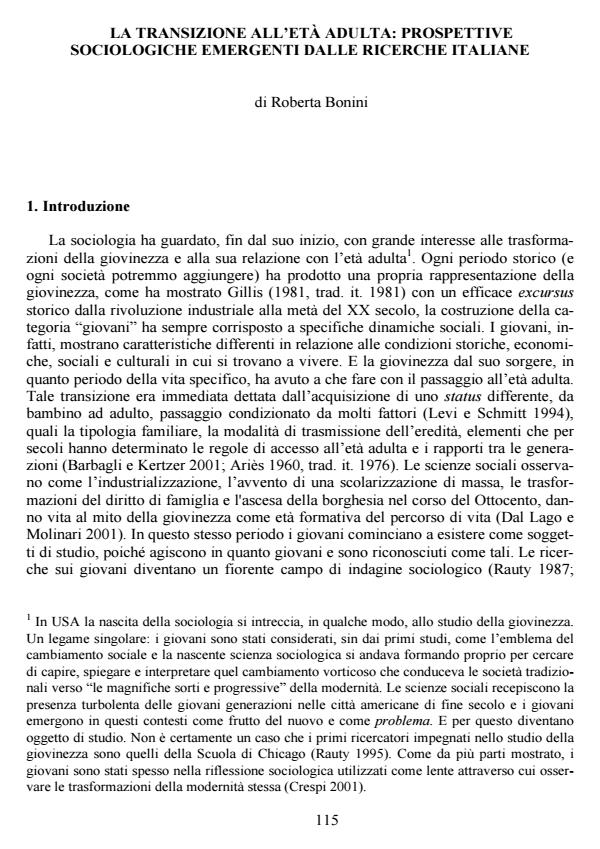La transizione all'età adulta: temi emergenti dalla ricerca sociologica italiana
Journal title SOCIOLOGIA E POLITICHE SOCIALI
Author/s Roberta Bonini
Publishing Year 2007 Issue 2007/2 Language Italian
Pages 17 P. 115-131 File size 96 KB
DOI
DOI is like a bar code for intellectual property: to have more infomation
click here
Below, you can see the article first page
If you want to buy this article in PDF format, you can do it, following the instructions to buy download credits

FrancoAngeli is member of Publishers International Linking Association, Inc (PILA), a not-for-profit association which run the CrossRef service enabling links to and from online scholarly content.
The transition to adulthood: sociological perspectives in the Italian studies ABSTRACT: Transition to adulthood has become a specific of sociological research towards the end of the ’80 when sociologist and psychologist underline a new life course phase. This new stage is distinct by adolescence and adulthood. The social research been concentrated specifically on like markers: to finish the studies, to enter into labour market, to get married, to have the first child, these are the thresholds that exceeded, indicate the achievement of the passage from youth to adulthood. In the last 20 years the sociologist observed a postponed transition: life markers are crossed later, there is no a clear biography trajectory, and choice are reversible. In this framework Italian sociology has observed these processes from different point of view: as a transformation of the young universe as a whole, as central issue to understand social inequalities, as specific life course stage that can identify new form of identity re-composition, as an intergenerational event concerning young, families and society. The article analyse main sociological research carried out in Italy on transition to adulthood. By this way, the author pinpoint four main fields of the sociological research. The first, the Survey by Iard on the Italian youth condition that since 1983 it has been studying the transformation that take place year by year. The second, the survey by Schizzerotto who inquires into the social inequalities that characterize the young adults. The third, by one the most recent research by Introini and Pasqualini who focalize in particularly the process of the identity formation and the recomposition of the personal and social life one that take place during the transition to the adulthood. The fourth, is by a relational-generational approach. From this point of view, the focal point is on the relational net between the current generations.
Roberta Bonini, La transizione all'età adulta: temi emergenti dalla ricerca sociologica italiana in "SOCIOLOGIA E POLITICHE SOCIALI" 2/2007, pp 115-131, DOI: